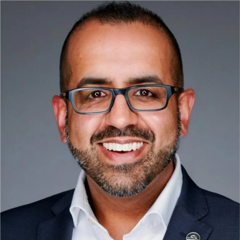Transforming Behavioral Healthcare: Our Clinical Priorities
By Stephanie Eken, M.D., Chief Medical Officer and Dr. Navdeep Kang, PsyD, Chief Quality Officer, Inpatient Services


The behavioral healthcare industry faces a myriad of challenges that must be addressed head-on if essential care is to be provided at scale to those in need. When we made the choice to join Acadia Healthcare, we did so because of the Company’s commitment to providing high-quality, comprehensive and accessible treatment across the country. While the industry and Acadia are making great progress, opportunities remain. That’s why we are focused on five clinical priorities that will allow us to continue to set the standard for patient care.
(1) Pioneering Standards that Improve Outcomes & Experiences
Variation in clinical standards across decentralized and fragmented systems exacerbates the challenges within healthcare – including behavioral medicine. As clinicians, we know that it is crucial to establish rigorous treatment protocols and translate science into practice consistently.
Reducing clinical variation is a primary focus for Acadia. We are leading efforts to apply uniform approaches across Acadia’s 250+ facilities to ensure consistent use of evidence-based practices, treatment options, and technology-based tools to measure outcomes and continuously improve care.
For example, we have consolidated 28 different withdrawal management protocols down to three best practices for alcohol and two for opioids. By standardizing our clinical excellence nationwide, Acadia created simplified, data-based procedures that both improve patient outcomes and drive a more efficient, rewarding clinician experience.
Our work won’t stop there. We are taking the same, successful approach with clinical order sets, documentation, decision support tools and more. These innovations position Acadia as an organization where patients seek care and clinicians want to practice.
(2) Quality Enabled by Technology
Behavioral healthcare is a technology laggard. The explicit exclusion of behavioral health facilities from the HITECH Act prevented incentives to adopt electronic medical records (EMRs), the standard of care in medical and surgical settings, and other technology advancements at inpatient psychiatric facilities.
When clinicians enter typical healthcare settings, they’re provided tablets and laptops on which to do their work. In behavioral healthcare, all that is often offered is a pen and a notepad. Patient information is frequently stored in filing cabinets and boxes, making the sharing of these critical details between providers difficult. Absent an industry-wide shift to EMRs and other technology investments, patient care will suffer.
At Acadia, we have already begun to invest an incremental $100M to modernize technology and enhance the experiences of our patients and healthcare professionals. With a focus on evidence-based practices and a dedication to making data-driven decisions, we are leading the industry by leveraging technology to ensure consistency and transparency in how quality care is delivered.
(3) Providing Safe Care – Always
Patients, staff and all those who engage in behavioral health deserve a safe environment – always. Every instance of harm or abuse is a violation of trust. At Acadia, we take this responsibility seriously.
That’s why our commitment to safety goes beyond just meeting the status quo. We are setting higher expectations for patient and staff safety while striving to deliver the highest quality outcomes in the industry through the accelerated implementation of EMRs, patient and employee safety solutions, deep industry training and uniform process improvements nationwide.
Acadia’s significant investments have allowed us to deploy real-time patient safety solutions at 100% of our Acute care facilities. In addition, across our network of 160 Comprehensive Treatment Centers (CTCs), which treat opioid use disorder (OUD), we are deploying predictive analytics into our care model which contributes to 80% of our patients being opioid-free in six months.
By the end of 2024, we will also have enhanced employee safety solutions in each of our hospitals. These technologies coupled with effective staff development programs, including training focused on best practices in milieu management and verbal de-escalation, all contribute to our culture of safety.
(4) Championing Access and Healthcare Equity
Unmet behavioral health treatment needs are at critical levels across the country. According to 2023 U.S. Centers for Disease Control & Prevention data, the steady rise in suicides this century is nearing 50,000 annually(1) . Almost 74,000 deaths were caused by synthetic opioids like fentanyl in 2022 alone(2) . And our country is short 75,000 beds to meet the growing demand for behavioral healthcare(3).. The gap between supply and demand results in prolonged suffering for many individuals. We have an escalating mortality crisis and yet have collectively failed to act with the urgency required to meet the challenge.
Acadia’s goal is to reach as many people in need of care as possible with services available across the full care continuum. We have joint ventures with 21 healthcare systems for 22 behavioral health hospitals, 11 of which are in operation and another 11 expected to open over the next few years. In 2023, we added over 300 new beds with another 400 expected by the end of 2024. In our CTC service line, we opened six brick and mortar opioid treatment programs while adding four mobile units and one office-based opioid treatment clinic.
We are also continuing to invest and expand outpatient treatment options including Partial Hospitalization Programs (PHP), Intensive Outpatient Programs (IOP) and virtual services to provide equitable access to care for everyone in need regardless of their situation or location. We added nearly 40 outpatient programs last year and have added an additional 30 in the first half of 2024.
It is not just about the numbers. Whether opening a facility or adding a service, we pay strict attention to ensuring we deliver quality, evidence-based care in a safe environment with expertly trained staff.
(5) Moving Beyond the Stigma
Perhaps the most significant barrier to accessing behavioral healthcare is the lingering stigma associated with these conditions. Many who have access to care still hesitate to seek help due to fear of judgment or discrimination. According to SAMHSA, 67% of people in need of behavioral healthcare services remain untreated and 94% of those with substance use disorder (SUD) receive no treatment at all(4). How many lives could be saved if we reduced the stigma surrounding treatment for behavioral healthcare? What if we could shift away from mortality and focus on how many people are successfully living with their opioid use disorder, as we do with countless other chronic diseases?
Everyone has a role to play in advancing the conversation about behavioral health, whether through education, advocacy or simply by fostering an environment of acceptance in their communities. Acadia will lead this discussion by voice and in action, including, for example, through our nationwide partnership with The Jason Foundation, which is dedicated to the prevention of youth suicide. By collectively challenging the stigma, we can create a more supportive landscape where seeking help is normalized and encouraged.
A Moment to Rise and Lead
The United States is facing a behavioral health crisis of unprecedented scale, demanding urgent and collective action. Whether you’re a healthcare professional, a community leader or simply someone who values the well-being of others, we invite you to join us in addressing this challenge.
Together, we can transform the behavioral healthcare system, ensuring that everyone in need can receive the quality care they deserve. Let’s move forward with compassion, commitment and a shared vision for a healthier future.
###
Bibliography
- Curtin, Sally C., et al. “Provisional Estimates of Suicide by Demographic Characteristics: United States, 2022.” NVSS: Vital Statistics Rapid Release, Centers for Disease Control and Prevention, Nov. 2023, www.cdc.gov/nchs/data/vsrr/vsrr034.pdf.
- “Drug Overdose Death Rates.” National Institutes of Health, U.S. Department of Health and Human Services, 30 May 2024, nida.nih.gov/research-topics/trends-statistics/overdose-death-rates.
- Healthcare, Acadia. 41st Annual J.P. Morgan Healthcare Conference, Acadia Healthcare, 10 Jan. 2023, acadiahealthcare.gcs-web.com/static-files/421bb792-8d93-4967-8789-a5409cb38934.
- “SAMHSA Announces National Survey on Drug Use and Health (NSDUH) Results Detailing Mental Illness and Substance Use Levels in 2021.” HHS.Gov, 4 Jan. 2023, hhs.gov/about/news/2023/01/04/samhsa-announces-national-survey-drug-use-health-results-detailing-mental-illness-substance-use-levels-2021.html#:~:text=In%202021%2C%2094%25%20of%20people,not%20think%20they%20needed%20treatment.